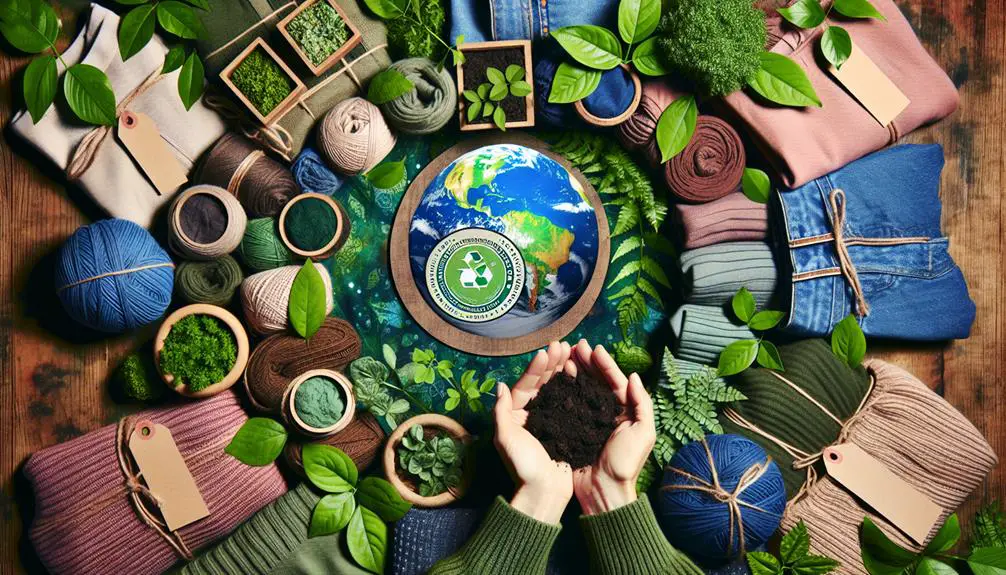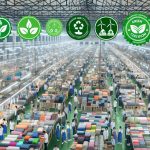When you consider the clothing you buy, how often do you think about the certifications behind the fabric? Sustainable textile certifications aren't just labels; they're an essential mechanism for ensuring that products adhere to high environmental and ethical standards. These certifications provide transparency and build trust, allowing you to support sustainable practices effortlessly. By understanding why these certifications matter, you'll gain insight into the environmental and social impacts of your choices. But what specific certifications should you look for, and how do they impact the industry? Let's explore this further.
Table of Contents
Key Takeaways
- Sustainable textile certifications ensure products meet environmental and ethical standards.
- Certifications promote transparency and traceability within the textile supply chain.
- Certified textiles reduce environmental impact by using efficient, eco-friendly practices.
- Certifications improve worker conditions, ensuring fair wages and safe working environments.
- Supporting certified products drives market demand for sustainable and ethical production.
Why Certifications Matter
Understanding why certifications matter helps you make informed choices about sustainable textiles. Certifications aren't just fancy labels; they're rigorous benchmarks that guarantee products meet specific sustainability criteria. By adhering to certification standards, textile manufacturers demonstrate their dedication to ethical practices, environmental stewardship, and quality assurance. When you see a certification mark, you know the product has undergone a thorough vetting process, which eliminates guesswork and provides peace of mind.
Industry recognition plays an essential role in this framework. Leading certifications are often endorsed by respected organizations within the textile sector, giving them credibility and trust. This acknowledgment means that certified textiles aren't only meeting high standards but are also recognized by industry experts. When you choose certified products, you're aligning yourself with best practices recognized globally, ensuring that you're supporting sustainable and ethical production methods.
Additionally, certifications help drive market demand for sustainable products. As more consumers seek out certified textiles, manufacturers are incentivized to adopt greener practices. This creates a positive feedback loop, encouraging continuous improvement in sustainability standards. So, by prioritizing certified textiles, you're contributing to a larger movement towards a more sustainable and responsible textile industry.
Key Certifications Explained
To help you navigate the world of sustainable textiles, let's break down some key certifications you should know about.
First, the Global Organic Textile Standard (GOTS) guarantees that textiles are made from at least 70% organic fibers. The certification criteria include strict environmental and social standards throughout the manufacturing process, from harvesting raw materials to labeling. GOTS certified products have a significant industry impact by promoting organic farming and fair labor practices.
Next, the OEKO-TEX Standard 100 certifies that textile products are free from harmful chemicals. To achieve this, items undergo rigorous testing for substances that could pose health risks. The certification process involves independent labs conducting these tests, ensuring a high level of safety for consumers. This certification has reshaped industry norms by prioritizing consumer health.
The Fair Trade Textile Standard focuses on ethical labor practices and fair wages. Its certification criteria demand transparency and equity in the supply chain, from cotton farmers to factory workers. The industry impact here is profound, as it drives social change and elevates worker conditions.
Environmental Benefits
Beyond their ethical and safety advantages, sustainable textile certifications offer considerable environmental benefits. When you choose certified textiles, you're actively participating in the reduction of environmental harm. These certifications guarantee that the production processes meet strict environmental standards, which directly contributes to a healthier planet.
Consider the following key environmental benefits:
- Reduced Waste: Certified textiles often involve manufacturing processes that minimize waste. By promoting efficient resource use, these processes help to decrease the volume of textile waste ending up in landfills.
- Lower Carbon Footprint: Sustainable certifications often require the use of energy-efficient technologies and renewable energy sources, which notably reduce the carbon footprint of textile production.
- Chemical Safety: Certifications guarantee that harmful chemicals are either not used or are safely managed, preventing them from contaminating water sources and the environment.
- Biodiversity Protection: Many certifications mandate sustainable farming practices, which help protect local ecosystems and biodiversity by avoiding harmful pesticides and promoting soil health.
Social Impact
Choosing sustainable textile certifications doesn't just help the environment; it also greatly improves the lives of workers and communities involved in the textile industry. By ensuring ethical sourcing, these certifications hold manufacturers accountable for the conditions under which textiles are produced. They mandate that workers are treated fairly, paid adequately, and provided with safe working environments.
When you support certified textiles, you're championing labor rights. These certifications often require compliance with international labor standards, which means no child labor, forced labor, or exploitative practices. Workers gain access to fair wages and benefits, notably enhancing their quality of life.
Moreover, sustainable certifications encourage community development. They often promote local sourcing, which bolsters regional economies and creates job opportunities. This local focus can lead to improved infrastructure and better access to education and healthcare for the community.
Choosing Certified Products
When selecting certified products, look for labels that guarantee ethical and sustainable practices. These certifications ensure that the textiles you're buying are produced under conditions that respect both people and the planet. Your choices drive demand for ethical sourcing and elevate consumer awareness, pushing the industry toward more responsible practices.
Consider these key certifications:
- Global Organic Textile Standard (GOTS): Affirms organic status of textiles from harvesting to manufacturing.
- Fair Trade Certified: Ensures fair wages and safe working conditions.
- OEKO-TEX Standard 100: Tests for harmful substances to guarantee products are safe for human use.
- Bluesign: Concentrates on sustainable production, minimizing environmental impact.
By opting for certified products, you support a transparent supply chain. These certifications provide a traceable path from raw materials to finished goods, offering insight into the production process. This transparency is essential for verifying that companies adhere to ethical standards.
As a conscientious consumer, you wield significant influence. Every certified product you purchase contributes to a more ethical and sustainable fashion industry. Make informed choices, demand transparency, and prioritize certifications that align with your values. Your decisions can lead to meaningful change in the textile supply chain.
Frequently Asked Questions
How Do Sustainable Textile Certifications Affect Product Pricing?
When you immerse yourself in sustainable textile certifications, you'll see cost implications drive up prices. However, increased market demand for eco-friendly products often justifies these costs, letting brands pass the buck to consumers seeking sustainability.
Are There Any Drawbacks to Obtaining Sustainable Textile Certifications?
You might face cost implications with obtaining sustainable textile certifications, which could impact your market competitiveness. However, the long-term benefits often outweigh these initial drawbacks, providing a competitive edge and meeting growing consumer demands for sustainability.
How Can Consumers Verify the Authenticity of a Certification?
You can verify the authenticity of a certification by researching the verification process. Look for certification standards and industry transparency. This builds consumer trust, ensuring that the certifications meet rigorous criteria and aren't just marketing tactics.
What Are the Common Challenges Faced by Manufacturers Seeking Certification?
You'll face challenges like maneuvering through the complex certification process and meeting stringent compliance requirements. It's crucial to stay updated on standards, invest in proper documentation, and make sure your entire supply chain adheres to necessary guidelines.
Do Sustainable Textile Certifications Impact the Durability of the Fabric?
Imagine purchasing a certified organic cotton shirt that lasts years. Sustainable textile certifications don't just guarantee reduced environmental impact; they also ensure fabric longevity. Certification validity builds consumer trust, confirming you're investing in durable, eco-friendly products.
- Where to Buy Sherpa Suede Fabric - July 12, 2025
- How to Draw or Illustrate the Texture of Suede Fabric - July 12, 2025
- What Is Baseball Suede Leather Fabric? - July 12, 2025






